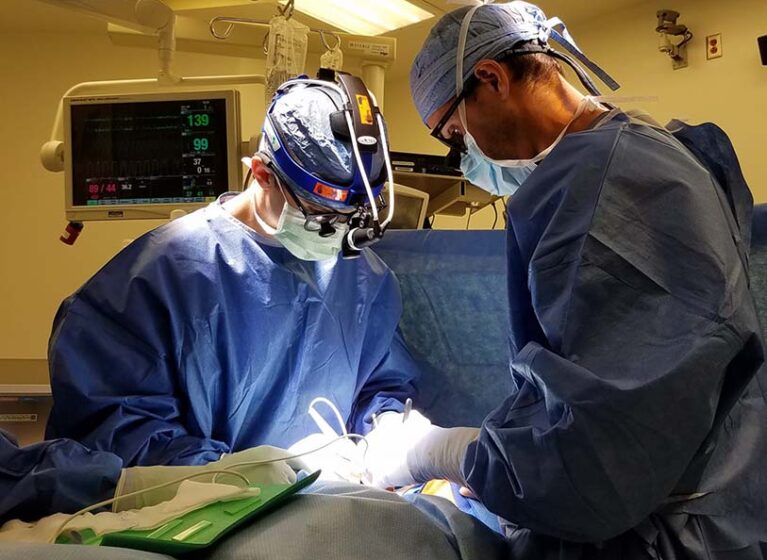
UVA Health is using molecular testing and neoadjuvant therapy to treat aggressive, advanced thyroid cancer, allowing some patients to be essentially cured of a disease that would otherwise have a less than 1-year life expectancy. The strategy follows the recommendations of a new medical consensus statement developed under the leadership of UVA Health's David Charles Shonka Jr., MD, an associate professor of head and neck surgical oncology.
Identifying Driving Mutations for Thyroid Cancer Expands Options
One of Shonka’s main areas of focus is thyroid and parathyroid surgery, where his research interests lie in improving oncologic outcomes.
Shonka is particularly driven to improve outcomes for patients with advanced forms of thyroid cancer, such as anaplastic and poorly differentiated thyroid cancers. These patients were often considered inoperable — especially if tumors were detected involving critical structures in the head and neck such as the carotid artery or brachiocephalic vein or if the cancer metastasized — and faced an average life expectancy of 3-6 months.
Now, Shonka and surgeons at UVA Health are conducting immunohistochemistry or sequencing of circulating tumor DNA to ascertain if patients carry the BRAFV600E mutation, which can be targeted with neoadjuvant dabrafenib and trametinib.
"This new approach gives us options we didn't have before," Shonka says. "We can start patients on medications that target the driving mutation and then reimage them after a few cycles to see if the cancer that was previously thought to be unresectable can now be managed with surgery."
Defining Advanced Thyroid Cancer & Its Targeted Treatment
The novel neoadjuvant approach aligns with a new consensus statement on mutational testing for advanced thyroid cancer issued by the American Head and Neck Society Endocrine Surgery Section and International Thyroid Oncology Group. Shonka played a key role in the development of the statement, serving as the project's quarterback, assembling the manuscript, and utilizing the modified Delphi method to assess degree of consensus for the statements developed by the panel of authors.
"One of our biggest goals was to exactly define advanced thyroid cancer," he says. "Those of us who treat it all the time know it when we see it, but there was nothing in the literature that objectively defined it or identified the factors that separate it from more common and less aggressive thyroid cancer."
Another goal, says Shonka, was to identify mutational drivers of the disease via thorough and efficient molecular testing, as UVA Health is doing for BRAFV600E mutation testing. The authors of the consensus statement concluded, "All patients with advanced thyroid cancer and most patients with incurable radioiodine refractory differentiated thyroid cancer should undergo somatic mutational testing. Next-generation sequencing can reveal targetable mutations and potentially give patients affected by advanced thyroid carcinoma systemic treatment options that can prolong survival."
Shonka adds, "The consensus statement provides specific guidance for targeted systemic treatment options, which is particularly useful for endocrinologists and surgeons who may not have much experience with these options and aren't yet using mutational testing as part of their decision-making process for managing advanced thyroid cancer."
Thyroid Tumor Board Reviews All UVA Health Patients
Shonka and his colleagues follow the spirit of the new consensus statement during their regular thyroid tumor boards, which they hold every other week to discuss all new thyroid cancer patients in a prospective manner. The multidisciplinary board of surgeons, endocrinologists, radiation oncologists, medical oncologists, pathologists, radiologists, and nuclear medicine specialists discusses each patient's disease process, reviews imaging and pathology, and develops consensus around treatment plans.
"Ever since I started these regular tumor boards 2 years ago, I have found them to be incredibly valuable to ensure we consider all options before surgery, after surgery, and before neoadjuvant treatment," Shonka says. "Many other health centers do not have these conferences or focus these conferences specifically on thyroid cancer, instead combining it with other head and neck cancers or reviewing only interesting or complicated cases."
Although the tumor board recommends surgery for most patients with thyroid cancer, additional or alternative treatments such as radioactive iodine or newer neoadjuvant treatment approaches are recommended when warranted.
"We have a wonderful team of surgeons performing very complex surgeries with high quality and excellent clinical outcomes," Shonka says. The team at UVA Health is capable of managing even extremely complex thyroid cancer surgeries such as those involving removal of portions of the trachea or carotid artery. "It is extremely gratifying to see everyone focused on reducing complications and helping our patients move forward from the profound effects of thyroid cancer."